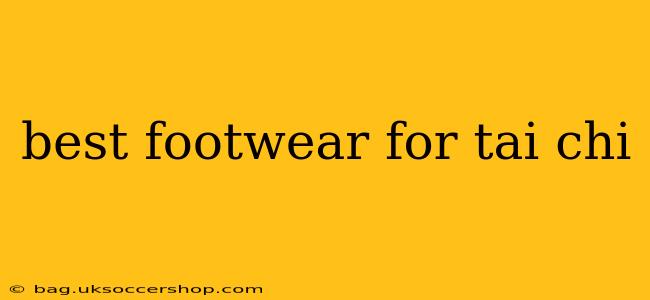Tai Chi Chuan, a graceful and flowing martial art, demands footwear that provides both support and flexibility. The right shoes can significantly enhance your practice, preventing injuries and allowing for optimal movement. Choosing the wrong footwear, however, can hinder your progress and even lead to discomfort. This guide will delve into the essential features to look for and offer recommendations for the best footwear for Tai Chi.
What Makes Good Tai Chi Shoes?
The ideal Tai Chi shoe balances several key factors:
- Flexibility: Your feet need to be able to bend and move naturally, mirroring the fluid transitions of Tai Chi forms. Stiff soles restrict movement and can negatively impact your balance and posture.
- Support: While flexibility is paramount, you still need adequate support to maintain stability, particularly during standing postures. A good shoe will provide enough arch support and cushioning to protect your feet and ankles.
- Lightweight: Tai Chi involves a lot of shifting weight and subtle movements. Heavy shoes can tire you out and impede your fluidity.
- Breathability: Your feet will likely sweat, especially during practice sessions. Breathable materials help keep your feet cool and dry, preventing discomfort and odor.
- Grip: A non-slip sole is crucial for safety, particularly on smooth surfaces. You need confidence that your feet will remain securely planted, even during complex movements.
- Low Profile: High heels or bulky shoes can throw off your balance and make it difficult to execute the low stances characteristic of Tai Chi. A low-profile design maintains a natural center of gravity.
What are the Best Types of Shoes for Tai Chi?
Many types of footwear can be suitable, depending on your preferences and practice environment. However, these generally work well:
- Tai Chi Shoes (Specifically Designed): These often feature a flexible, low-profile sole with good grip and breathable uppers. Many also offer additional arch support. While they can be pricier, they are typically optimized for the specific needs of Tai Chi practice.
- Martial Arts Shoes: Similar to Tai Chi-specific shoes, these prioritize flexibility and grip. Look for ones with a thinner, flatter sole.
- Yoga Shoes/Socks: For those practicing barefoot or wanting minimal footwear, yoga shoes or socks can provide lightweight support and grip while maintaining flexibility. However, they may not provide enough support for extended sessions or those with existing foot problems.
- Athletic Shoes (with Considerations): Certain athletic shoes, particularly those designed for walking or running, can suffice. However, ensure they are lightweight, flexible, have good grip, and a low profile. Avoid bulky running shoes with overly thick soles.
What to Avoid When Choosing Tai Chi Shoes?
- Shoes with high heels or thick soles: These disrupt your balance and limit your flexibility.
- Shoes with poor grip: This significantly increases the risk of slipping and falling, especially on smooth surfaces.
- Shoes that are too tight or too loose: Proper fit is essential for comfort and support. Choose shoes that are snug but not constricting.
- Shoes made from non-breathable materials: These can lead to sweaty, uncomfortable feet.
H2: Are barefoot Tai Chi practices acceptable?
Practicing Tai Chi barefoot can offer a closer connection to the ground, enhancing your sensitivity and balance. However, it's essential to ensure the practice surface is clean, smooth, and free of debris to avoid injuries. Barefoot practice might not be suitable for all environments or individuals, particularly those with foot sensitivities.
H2: What kind of sole is best for Tai Chi shoes?
The ideal sole for Tai Chi shoes is flexible yet durable, providing both comfort and grip. Rubber soles are generally a good choice due to their grip and durability. Look for soles that are not too thick, maintaining a low profile without sacrificing cushioning.
H2: Do I need special shoes for outdoor Tai Chi practice?
For outdoor practice, prioritize shoes with good grip to ensure stability on uneven surfaces. Consider shoes with water-resistant properties if you practice in wet conditions. Remember, outdoor surfaces may require a more robust sole compared to indoor practice.
H2: Can I use my regular walking shoes for Tai Chi?
While some walking shoes might be suitable, it's best to avoid those with excessive cushioning or rigid soles. Opt for lightweight walking shoes with flexible soles and good grip for a more comfortable and effective practice.
Ultimately, the best footwear for Tai Chi is the pair that best fits your individual needs and preferences. Prioritize flexibility, support, and grip while considering the environment where you practice. Consider trying on several different types of shoes before making a decision to ensure a comfortable and supportive fit that will enhance your Tai Chi journey.
